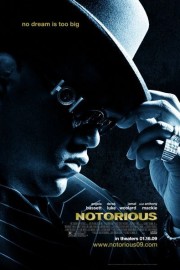Notorious
Musician biopics (or documentaries) are a point of interest to me, regardless of what genre, what era. Whether it’s about classical mavericks like Mozart and Beethoven, legendary artists like Ray Charles and The Rolling Stones, or iconic rappers like Tupac and, in this case, the Notorious B.I.G., it’s fascinating to see how the filmmakers approach the life of creative artists who lived their lives like they made their music.
When it comes to the life of Biggie Smalls- born Christopher Wallace, and played with vivid flash and soul by newcomer Jamal Woolard- the screenwriters, including B.I.G. biographer Cheo Hodari Coker, and producers (including Biggie’s mother Voletta and hip-hop mentor Sean “Puffy” Combs) stick with just enough facts to present Wallace’s story as your typical “rags to riches” tale and plenty of sentiment and sympathy to see how he was a victim of outside forces when he was shot down in an as-yet-unsolved drive-by shooting in L.A. in 1997.
That doesn’t make the film any less intriguing to watch. Director George Tillman Jr. (best known for his endearing 1997 crossover drama “Soul Food”) does get to some of the harsh truths about this icon, illuminated by his early run-ins with the law selling crack on the New York streets; the East-West rap war that started when former friend Tupac was gunned down outside of B.I.G.’s studio in New York- the media uproar between the two indirectly led to their respective deaths; and especially, his treatment of the women in his life. His mother (terrifically played by Angela Bassett) has some success getting through to him, but baby mamas Faith Evans (Antonique Smith) and Jan (Julia Pace Mitchell)- not to mention jilted protege Lil’ Kim (a fantastic Naturi Naughton)- get hit hard when fame goes to Biggie’s head.
Still, you can’t help but get caught up in Wallace’s story, which- at its core- has one simple truth to give its audience about those- like Smalls and Combs (played by a fiery Derek Luke)- who swing for the fences in hopes of changing the world. As the two say late in the film, “You can’t change the world until you change yourself.” So true it is. And even if it glosses over some of the controversy Wallace dealt with in his all-too-brief life (he was 24 when he was killed, just days before his second album- “Life After Death”- was released), there’s no denying that Wallace- as played by Woolard in a breakthrough performance that would garner Oscar attention in a more prestigious production- had found that opportunity to change himself by the end. The mobs of people following his funeral procession in the end shows how his art made a difference.










